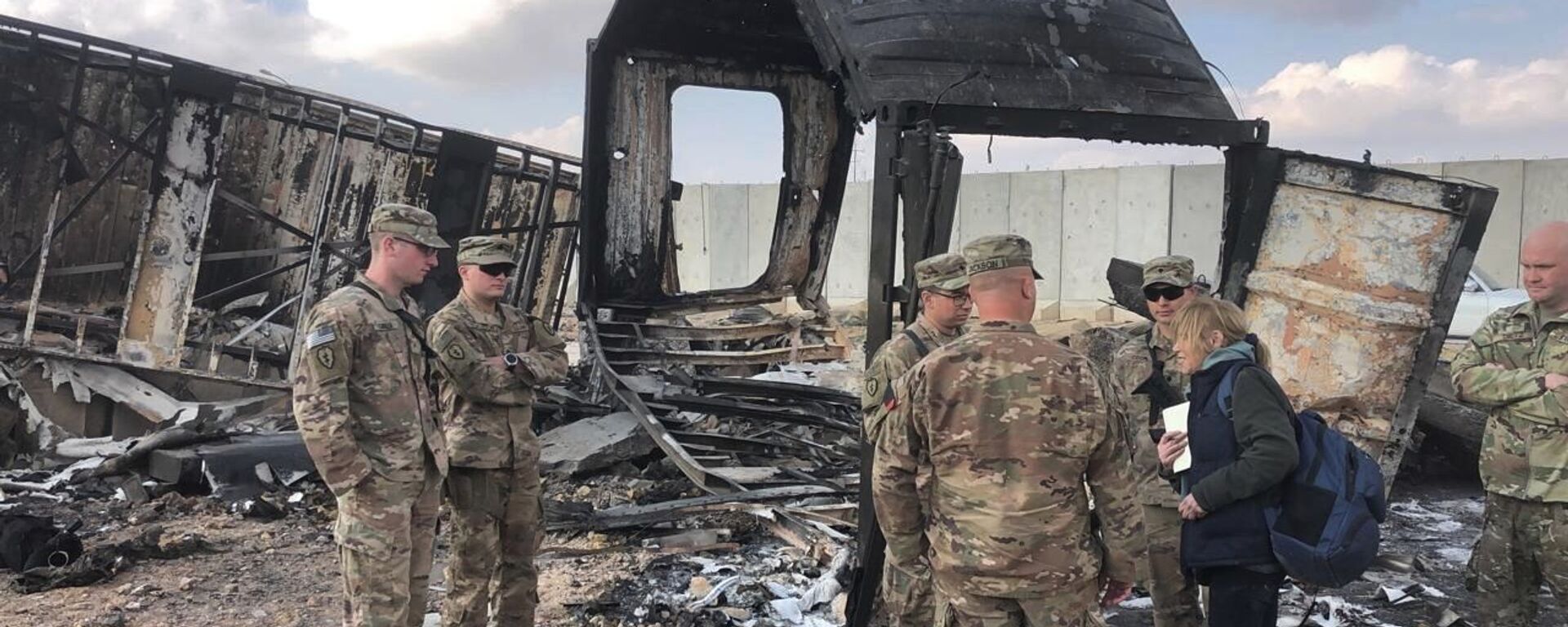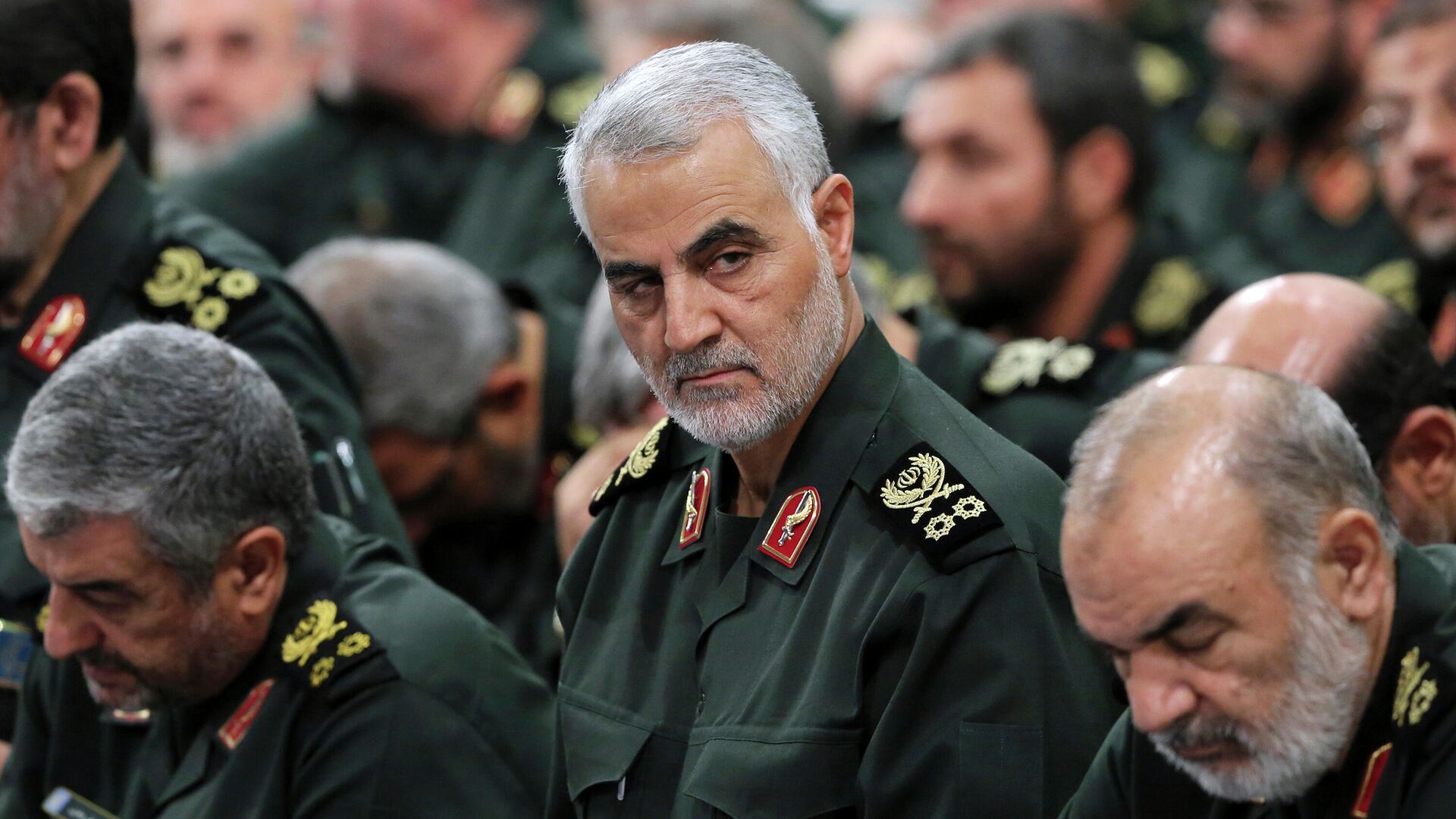https://sputnikglobe.com/20211231/iran-says-current-us-administration-bears-responsibility-for-general-qassem-soleimanis-killing-1091948626.html
Iran Says Current US Administration Bears Responsibility for General Qassem Soleimani's Killing
Iran Says Current US Administration Bears Responsibility for General Qassem Soleimani's Killing
Sputnik International
The White House is still "responsible" for the killing of Quds Force General Qassem Soleimani and Tehran plans to persecute those complicit in his death, Iran's Foreign Ministry has stated.
2021-12-31T21:12+0000
2021-12-31T21:12+0000
2021-12-31T21:12+0000
joe biden
us
iran
general soleimani
qasem soleimani
https://cdn1.img.sputnikglobe.com/img/07e5/0c/1f/1091948574_0:0:3001:1688_1920x0_80_0_0_51e6e973cd63d858e097ff46af021998.jpg
The White House is "responsible" for the killing of Quds Force General Qassem Soleimani and Tehran plans to persecute those complicit in his death, Iran's Foreign Ministry stated, ahead of the second anniversary of Soleimani's assassination by the US.Tehran cited global legal standards to support the narrative that the US bears "definitive international responsibility" for assassinating Soleimani on 3 January 2020 as he was leaving Baghdad International Airport in a car. The general, who led the Islamic Revolutionary Guards Corps' foreign branch, had arrived in Iraq on that day to pass a diplomatic note to Saudi Arabia, with Baghdad's mediation.Iran's Foreign Ministry noted in its statement that it has adopted a number of measures to combat what it described as the "impunity of criminals" and to hold accountable those responsible for the general's assassination via the courts.Soleimani was killed in a US drone strike in 2020, ordered by then-US President Donald Trump. Trump and his administration justified the assassination by baselessly claiming that Soleimani was planning a series of attacks on American "interests" in the region. The US embassy in Iraq at the time regularly came under rocket and mortar fire from various local militant groups, but Tehran never claimed responsibility for these attacks. Washington claimed at the time that Tehran backed these groups.Responding to the general's assassination, Iran launched a massive missile strike on two military bases in Iraq hosting US troops. While no American servicemen died in the course of the attack, several received what was described by the Pentagon as traumatic brain injuries from the explosions. After the retaliatory attack, Tehran continued to observe that it is yet to avenge Soleimani's death, prompting fears of new attacks a year later, on the second anniversary of the general's assassination.
https://sputnikglobe.com/20211217/us-bracing-for-attacks-on-troops-in-iraq-as-soleimani-assassination-anniversary-nears-1091611899.html
iran
Sputnik International
feedback@sputniknews.com
+74956456601
MIA „Rosiya Segodnya“
2021
Tim Korso
https://cdn1.img.sputnikglobe.com/img/07e6/03/0d/1093831826_0:0:216:216_100x100_80_0_0_e3f43a960af0c6c99f7eb8ccbf5f812c.jpg
Tim Korso
https://cdn1.img.sputnikglobe.com/img/07e6/03/0d/1093831826_0:0:216:216_100x100_80_0_0_e3f43a960af0c6c99f7eb8ccbf5f812c.jpg
News
en_EN
Sputnik International
feedback@sputniknews.com
+74956456601
MIA „Rosiya Segodnya“
Sputnik International
feedback@sputniknews.com
+74956456601
MIA „Rosiya Segodnya“
Tim Korso
https://cdn1.img.sputnikglobe.com/img/07e6/03/0d/1093831826_0:0:216:216_100x100_80_0_0_e3f43a960af0c6c99f7eb8ccbf5f812c.jpg
qassem soleimani, soleimani's killing, us-iran relations
qassem soleimani, soleimani's killing, us-iran relations
Iran Says Current US Administration Bears Responsibility for General Qassem Soleimani's Killing
The leader of Iran's elite Quds Force was assassinated almost two years ago under the order of US President Donald Trump. Tehran has since vowed to avenge the death of the popular general, maintaining the pledge even after retaliatory strikes against bases in Iraq hosting US troops.
The White House is "responsible" for the killing of Quds Force General Qassem Soleimani and Tehran plans to persecute those complicit in his death, Iran's Foreign Ministry stated, ahead of the second anniversary of Soleimani's assassination by the US.
"Undoubtedly, the criminal act of the US in martyring General Soleimani is a clear manifestation of a 'terrorist attack' that was orchestrated and carried out in an organised manner by the then-US government, for which the White House is now responsible", the ministry tweeted.
Tehran cited global legal standards to support the narrative that the US bears "definitive international responsibility" for assassinating Soleimani on 3 January 2020 as he was leaving Baghdad International Airport in a car. The general, who led the Islamic Revolutionary Guards Corps' foreign branch, had arrived in Iraq on that day to pass a diplomatic note to Saudi Arabia, with Baghdad's mediation.
Iran's Foreign Ministry noted in its statement that it has adopted a number of measures to combat what it described as the "impunity of criminals" and to hold accountable those responsible for the general's assassination via the courts.
"These measures have been taken in the political, legal, international and public diplomacy dimensions. In this regard, in the foreign and international arena, special efforts were made to prevent the distortion of truth by the United States and its manipulation of the situation", the ministry said.
Soleimani was killed in a
US drone strike in 2020, ordered by then-US President Donald Trump. Trump and his administration justified the assassination by baselessly claiming that Soleimani was planning a series of attacks on American "interests" in the region. The US embassy in Iraq at the time regularly came under rocket and mortar fire from various local militant groups, but Tehran never claimed responsibility for these attacks. Washington claimed at the time that Tehran backed these groups.

17 December 2021, 17:28 GMT
Responding to the general's assassination, Iran launched a massive missile strike on two military bases in Iraq hosting US troops. While no American servicemen died in the course of the attack, several received what was described by the Pentagon as traumatic brain injuries from the explosions. After the retaliatory attack, Tehran continued to observe that it is yet to avenge Soleimani's death, prompting fears of new attacks a year later, on the second anniversary of the general's assassination.





